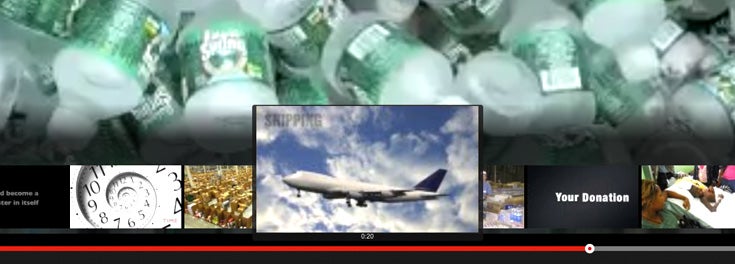
When disaster strikes, there’s nothing cold about cash. Just ask the team of URI business and engineering students who got together to prove it. At the suggestion of URI Assistant Business Professor Koray Özpolat, these enterprising students joined forces to create an online donation calculator to demonstrate the inefficiency of donating goods for disaster relief and make the case for giving money instead.
Relief workers have long known that donated goods are hugely expensive to ship overseas and often clog supply lines to those in need. “Time is of the essence when there is a disaster,” says Professor Özpolat, for whom the humanitarian side of supply chain management is of critical importance. Before coming to URI, he worked for the United Nations in Jordan serving refugee camps in the Near East. What he saw there has inspired him to continually look for ways to improve the living conditions of people in crisis, and in partnership with USAID, he’s inspiring his students to do the same.
We are helping to improve disaster relief. This is our social responsibility side and the students are helping to make a small change in the world.
Last year, Juanita Rilling, director of USAID’s Center for International Disaster Information (CIDI), proposed the idea of a “humanitarian calculator” to Professor Özpolat. His students had won 2nd and 3rd place in CIDI’s 2012 Public Service Announcements for Disaster Relief Contest, and she thought he’d be the right person for the job.
So, at a University where cross-discipline collaboration is the rule rather than the exception, Professor Özpolat reached out to Associate Professor Resit Sendag from URI’s Electrical, Computer, and Biomedical Engineering Department. Together, they invited business students Richard Kalhofer and Christopher O’Keefe to work on the logistics aspect of the calculator and computer engineering student Ben Ricci to figure out the web design, code, and calculations application, giving these students the opportunity to work on a real world solution that provides a genuine humanitarian service.
So now, if you visit the CIDI website, you’ll discover how to be smart about giving to those in need—thanks to the Greatest Good Donation Calculator created by URI students. Just choose an item, shipping location, and destination, and the calculator will tell you, for example, that shipping a single pair of jeans from Washington, D.C. to Kabul, Afghanistan, will cost $202.05—the same amount a local relief organization could spend on 40,410 liters of drinking water.
And that’s not all. Again this spring, Professor Özpolat’s operations and supply chain management students created public service announcements (PSAs) designed to encourage smart compassion—and were among the winners in both the broadcast and print categories of the 2013 PSAid: Public Service Announcements for International Disasters competition. Both the “Give Smart” video and the “Don’t Get Lost the Clouds” print (PSAs) reflect the importance of giving money instead of donating items. A panel of judges from the philanthropic, disaster relief, and communications fields selected the winning PSAs, which have been distributed nationally and can be viewed on the PSAID website.
“We are helping to improve disaster relief,” he says. “This is our social responsibility side and the students are helping to make a small change in the world.”
